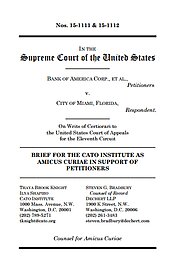The plan works by engaging the services of plaintiffs’ counsel (who typically work on a contingency fee, requiring the city to pay nothing out of pocket) to sue mortgage lenders under the Fair Housing Act (FHA). The city claims that it has suffered from a diminished tax base, in addition to an increase in the need for its services, all thanks to lenders’ alleged discriminatory practices.
While this is an interesting theory, it falls well outside the problems the FHA was designed to address. It seems the Supreme Court may also question whether the FHA permits this type of suit as it has granted certiorari in the case Bank of America v. City of Miami. On Monday, the Cato Institute filed a brief in support of Bank of America and its co-defendant, Wells Fargo.
The FHA is a provision of the 1968 Civil Rights Act, and was designed to address discrimination in access to housing. It creates a cause of action for “aggrieved persons” to sue when they believe they have been subject to discrimination. Generally, “aggrieved person” has been understood to mean a person who has actually suffered the effects of discrimination. For example, by being guided to certain neighborhoods based on racial make-up, or being denied the chance to rent a certain apartment because of race. It has even been found to mean people who have been denied the benefits of living in a racially integrated environment because of discrimination directed at prospective neighbors. But in each of these examples, the harm is clearly one that relates to the effects of discrimination in housing access.
Miami’s argument, though, creates a much more attenuated relationship between the alleged discriminatory actions and the harm.
Aside from the problems that such an interpretive stretch creates with regard to the roles of the judiciary and legislature, Miami’s interpretation also creates a deeply problematic relationship between the City and its citizens. In general, when a government wants more money to spend, it must go before its electorate and obtain the people’s consent through increases in taxes. If instead a city can simply pursue a claim against several big banks, it can dispense with the people’s consent and instead reach right for the cash.
The Court has indicated that its past statements suggesting a wide interpretation of the FHA may have been ill-advised. We hope that the Court affirmatively constrains the FHA to its proper application: helping those who have been the victims of discrimination. Not helping governments dip into deep pockets.
